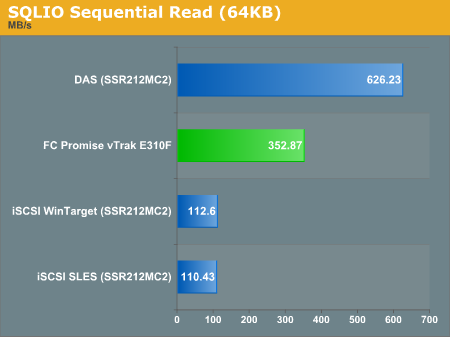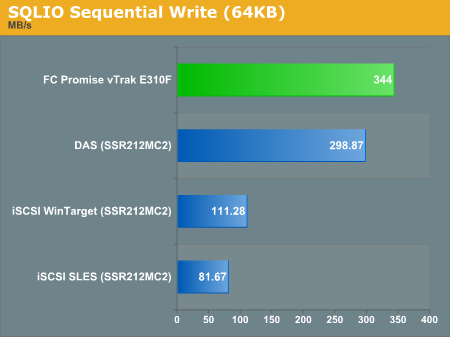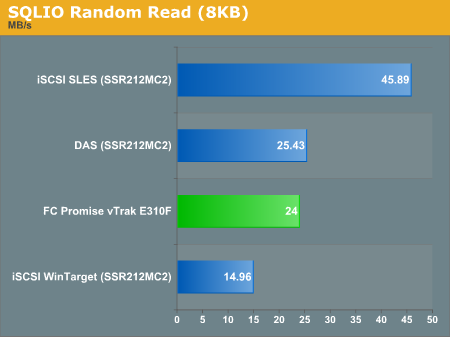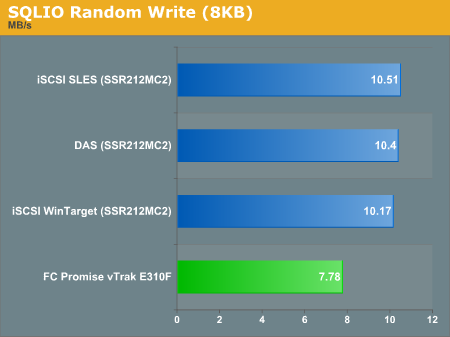Affordable storage for the SME, part one
by Johan De Gelas on November 7, 2007 4:00 AM EST- Posted in
- IT Computing
SQLIO
SQLIO is a tool provided by Microsoft which can determine the I/O capacity of a given disk subsystem. It should simulate somewhat how MS SQL 2000/2005 accesses the disk subsystem. The following tests use RAID 5. You can see a typical SQLIO test command below:
sqlio" -s120 -b64 -LS -o16 -fsequential file.tst >> result.txt
We ran tests as long as 1000 seconds, but there was very little difference with our standard 120 second testing.

The SQLIO results mimic the I/O Meter results. The DAS configuration is limited by the maximum throughput of our disks, and the other configurations are limited by their interface speed.

The VTRAK E310f outruns the rest in the SQLIO sequential write test. An important reason is that as we write, parity blocks have to be recalculated and a fast 1.2 GHz IOP processor helps in this scenario.
Next, we tested with Random reads.

Surprisingly, the iSCSI SLES target is almost twice as fast as our DAS configuration. Thus, the SLES target is essentially faster than the "maximum performance" of the disk array. This is the result of rather clever caching as we will show further.

The SQLIO random write was the only test where the Promise VTRAK E310f was a bit slower than the rest of the pack. We could not determine any reason for this.
SQLIO is a tool provided by Microsoft which can determine the I/O capacity of a given disk subsystem. It should simulate somewhat how MS SQL 2000/2005 accesses the disk subsystem. The following tests use RAID 5. You can see a typical SQLIO test command below:
sqlio" -s120 -b64 -LS -o16 -fsequential file.tst >> result.txt
We ran tests as long as 1000 seconds, but there was very little difference with our standard 120 second testing.

The SQLIO results mimic the I/O Meter results. The DAS configuration is limited by the maximum throughput of our disks, and the other configurations are limited by their interface speed.

The VTRAK E310f outruns the rest in the SQLIO sequential write test. An important reason is that as we write, parity blocks have to be recalculated and a fast 1.2 GHz IOP processor helps in this scenario.
Next, we tested with Random reads.

Surprisingly, the iSCSI SLES target is almost twice as fast as our DAS configuration. Thus, the SLES target is essentially faster than the "maximum performance" of the disk array. This is the result of rather clever caching as we will show further.

The SQLIO random write was the only test where the Promise VTRAK E310f was a bit slower than the rest of the pack. We could not determine any reason for this.










21 Comments
View All Comments
Lifted - Wednesday, November 7, 2007 - link
I'm just wondering this sentence was linked to an article about a Supermicro dual node server. So you considere Supermicro an SME, or are you saying their servers are sold to SME's? I just skimmed the Supermicro article, so perhaps you were working with an SME in testing it? I got the feeling from the sentence that you meant to link to an article where you had worked with SME's in some respect.
JohanAnandtech - Wednesday, November 7, 2007 - link
no, Supermicro is not an SME in our viewpoint :-). Sorry, I should have been more clear, but I was trying to avoid that the article lost it's focus.I am head of a serverlab in the local university and our goal is applied research in the fields of virtualisation, HA and Server sizing. One of the things we do is to develop software that helps SME's (with some special niche application) to size their server. That is what the link is going towards, a short explanation of the stresstesting client APUS which has been used to help quite a few SMEs. One of those SMEs is MCS, a software company who develops facility management software. Basically the logs of their software were analyzed and converted by our stresstesting client into a benchmark. Sounds a lot easier than it is.
Because these applications are used in real world, and are not industry standard benchmarks that the manufacturers can tune to the extreme, we feel that this kind of benchmarking is a welcome addition to the normal benchmarks.
hirschma - Wednesday, November 7, 2007 - link
Is the Promise gear compatible with Cluster File Systems like Polyserve or GFS? Perhaps the author could get some commentary from Promise.JohanAnandtech - Wednesday, November 7, 2007 - link
We will. What kind of incompatibility do you expect? It seems to me that the filesystem is rather independent from the storage rack.hirschma - Thursday, November 8, 2007 - link
I only ask because every cluster file vendor suggests that not all SAN systems are capable of handling multiple requests to the same LUN simultaneously.
I can't imagine that they couldn't, since I think that cluster file systems are the "killer app" of SANs in general.
FreshPrince - Wednesday, November 7, 2007 - link
I think I would like to try the intel solution and compare it to my cx3...Gholam - Wednesday, November 7, 2007 - link
Any chance of seeing benchmarks for LSI Engenio 1333/IBM DS3000/Dell MD3000 series?JohanAnandtech - Wednesday, November 7, 2007 - link
I am curious why exactly?And yes, we'll do our best to get some of the typical storage devices in the labs. Any reason why you mention these one in particular (besides being the lower end of the SANs)
Gholam - Thursday, November 8, 2007 - link
Both Dell and IBM are aggressively pushing these in the SMB sector around here (Israel). Their main competition is NetApp FAS270 line, which is considerably more expensive.ninjit - Wednesday, November 7, 2007 - link
It's a good idea to define all your acronyms the first time you use them in an article.Sure, a quick google told me what an SME was, but it's helpful to the casual reader, who would otherwise be directed away from your page.
What's funny, is that you were particular about defining FC, SAN, HA on the first page, just not the title term of your article.